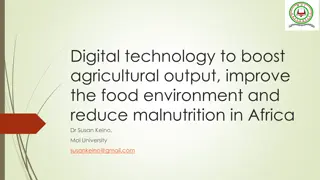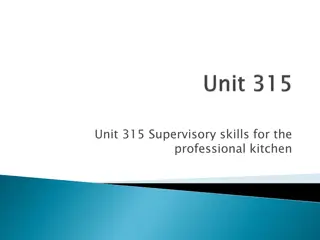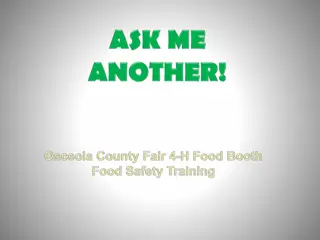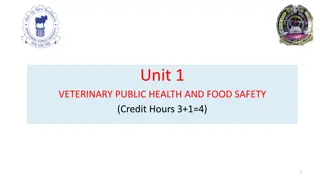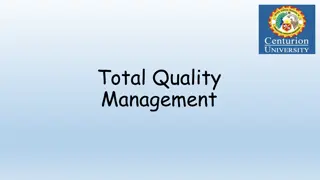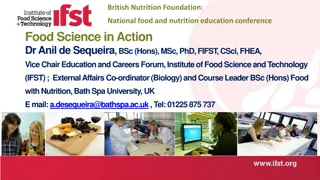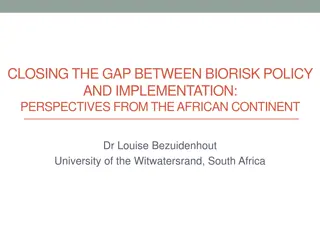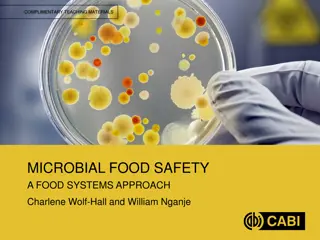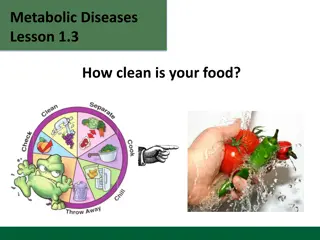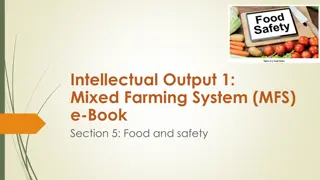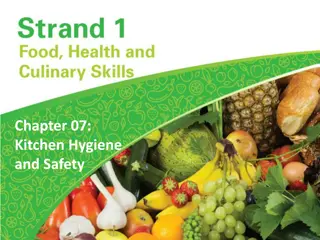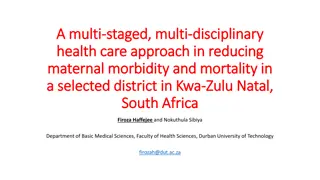Implementing Successful Food Safety Systems in South Africa: Roles and Responsibilities
Enhance food safety across South Africa by understanding the crucial roles everyone plays in implementing successful food safety systems. Dr. P. Vincent Hegarty emphasizes the importance of effective regulation, monitoring, analysis, and education to ensure the safety of our food supply.
Download Presentation

Please find below an Image/Link to download the presentation.
The content on the website is provided AS IS for your information and personal use only. It may not be sold, licensed, or shared on other websites without obtaining consent from the author. Download presentation by click this link. If you encounter any issues during the download, it is possible that the publisher has removed the file from their server.
E N D
Presentation Transcript
SOUTH AFRICA: Pretoria MARCH 2016 IMPLEMENTING SUCCESSFUL FOOD SAFETY SYSTEMS: IMPORTANT ROLES FOR EVERYBODY DR. P. VINCENT HEGARTY Founding Director and Professor Emeritus INSTITUTE for FOOD LAWS and REGULATIONS MICHIGAN STATE UNIVERSITY vhegarty@msu.edu www.iflr.msu.edu
IS OUR FOOD SAFE?
WE ARE ALL PARTNERS IN REGULATING FOOD SAFETY GOVERNMENT Create/Monitorr CONSUMERS UNIVERSITIES Analyze/Educate FOOD INDUSTRY Implement
Nature Biotechnology, Vol. 17, May 1999 diplomas. aren t my No, those
I dont want to know what the law is, I want to know who the judge is. Roy H. Cohn JUDGE
CODEX: SOUTH AFRICA ATTENDANCE (Number of attendees in brackets) CCFFP 2015 YES (5) Norway 2014 YES (4) Norway 2012 YES (6) Indonesia CCFH 2015 NO 2014 YES (1) Peru 2013 YES (3) Vietnam CCFL 2014 YES (2) Italy 2013 YES (2) Canada CCFA 2015 YES (1) China 2014 YES (1) China 2013 YES (1) China CCPR 2015 NO 2014 NO 2013 NO 2012 NO 2011 NO 2010 YES (2) China CCCF 2015 NO 2014 NO 2013 NO 2012 YES (1) Netherlands 2011 YES (2) Netherlands
CODEX: SOUTH AFRICA ATTENDANCE (Continued) 2012 YES (3) Germany 2011 YES (3) Germany 2010 YES (4) Chile CCNFSDU 2015 YES (3) Germany 2014 YES (3) Indonesia 2013 YES (1) Germany CCRVDF 2015 YES (1) Costa Rica 2013 YES (3) USA CCFFV 2015 NO 2014 YES (1) Thailand 2012 YES (2) Mexico CCFICS 2015 YES (4) Australia 2013 YES (1) Thailand CCPFV 2014 YES (1) USA 2012 NO CCMAS 2015 NO 2014 NO 2013 NO
SOUTH AFRICAN FOOD: US FDA IMPORT REFUSALS (2015) www.accessdata.fda.gov/scripts/importrefusals Medical Foods Misbranding Raisins Filthy Dates Filthy Vegetables Adulteration Candy List of ingredients Dietary Food Misbranding Mushroom Soup Unsafe color Dried Fruit Filthy Soft Drinks Unsafe color
WHY ARE THESE COMPANIES ON THE FDA REJECTION LIST? THEY ARE: IGNORANT CARELESS CRIMINAL OR SOME OR ALL OF THE ABOVE
THE BOTTOM LINE ON FOOD SAFETY: UNSAFEFOOD COULD COST YOU: YOUR life YOUR business YOUR job YOUR industry s and YOUR country s reputation
FOOD SAFETY: SOME HUMAN COSTS (2011) WHO: 200 diseases are spread through food EU: E.coli 0104:H4 750 deaths; >4,000 sick USA: Listeria, cantaloupes 31 deaths; 146 sick CHINA: Food safety law violations 290 people sentenced to prison or to death
REMEMBER YOU arean important link in the food chain from Farm to Fork Do NOT be its weakest food safety link Know YOUR food safety role in the food chain
YOUR FOOD SAFETY GOAL ACTIVE MANAGERIAL CONTROL OF FOODBORNE ILLNESS RISK FACTORS 15
RISK ASSESSMENT (SOME EXAMPLES) HIGH RISK = 3; MEDIUM RISK = 2; LOW RISK = 1 PRIMARY PRODUCERS: Meat, poultry, dairy, fish/seafood 3 Fresh fruit and vegetables (primary producers 3 Honey (Production only) 1 MANUFACTURERS: Baby food (Non-milk based) Cereal products 2 Bakery/Confectionery (Egg/cream based products) 3 Bakery/Confectionery (Chocolate/sweets/sugar) 2 Bakery/Confectionery (Bread, cake, etc) 1 3
RISK ASSESSMENT (Continued: RETAILERS: Delicatessen Food stall (Ready-to-eat) Food stall (Fruit and vegetables, sweets, etc) Grocery (With portioning/open food) Grocery (Pre-packed food only) Ice cream sellers 3 3 2 3 1 3 SERVICE SECTORS: Caterers (Serving to final customer) Hotel (Breakfast only) Day Care (Regenerating and serving meals) 3 1 2
Standards for Continuous Improvement Measure *Self Assess Improve Plan 23
SAFER FOOD, BETTER BUSINESS (SFBB) www.food.gov.uk/foodindustry/regulation/hygleg/hyglegresources/sfbb SFBB toolkit --- help on food hygiene regulations for: Caterers Retailers Different cuisines Other languages Childminders Care homes Colleges
THE BOTTOM LINE: SAFER FOOD, BETTER BUSINESS POOR FOOD HYGIENE IS BAD FOR BUSINESS Safer food can be achieved (usually) with low costs in time and resources The costs of not achieving are huge, even going out of business www.food.gov.uk/foodindustry/regulation/hygleg/hyglegresources
RECOMMENDATION: Adoption of Food Safety Management Systems (FSMS) and a Safer food, Better business slogan will give: Safer food Higher profits Increased competitiveness in domestic and export markets Better trained staff Consumer confidence Etc, etc, etc, etc.
WHO: 10 FACTS ON FOOD SAFETY www.who.int/features/factfiles/food_safety/en 1. More than 200 diseases are spread through food 2. Foodborne diseases are increasing worldwide 3. Food safety is a global concern 4. Emerging diseases are tied to food production 5. Minimize the risk of avian influenza 6. Preventing disease starts on the farm 7. Chemical hazards can contaminate food
WHO: 10 FACTS ON FOOD SAFETY (Continued: 8. Everyone plays a role in food safety 9. School is a place for food safety 10. Five keys to food safety: 1. Keep clean 2. Separate raw from cooked 3. Cook all foods thoroughly 4. Keep food at safe temperatures 5. Use safe water and raw materials
CAN UNIVERSITIES ASSIST GOVERNMENTS and FOOD INDUSTRY?: YES by: Neutral analysis of food regulations Global perspectives on food safety / food laws Training courses, workshops, updates Distance education courses in food regulations and in food safety
CODEX DOCUMENTS AVAILABLE OVER THE INTERNET
FOOD LAWS & REGULATIONS The letter of the law Policy issues: Scientific Agricultural Economic Political Social Cultural Ethical Religious
THE FINAL BOTTOM LINE YOUR attention to food safety issues is important and ongoing YOU are key people in implementing and supporting a successful food safety system for YOUR: Company Industry Customers Country
THANKS GO RAIBH MAITH AGAIBH (Irish) TO: YOU IUFoST SAAFoST




